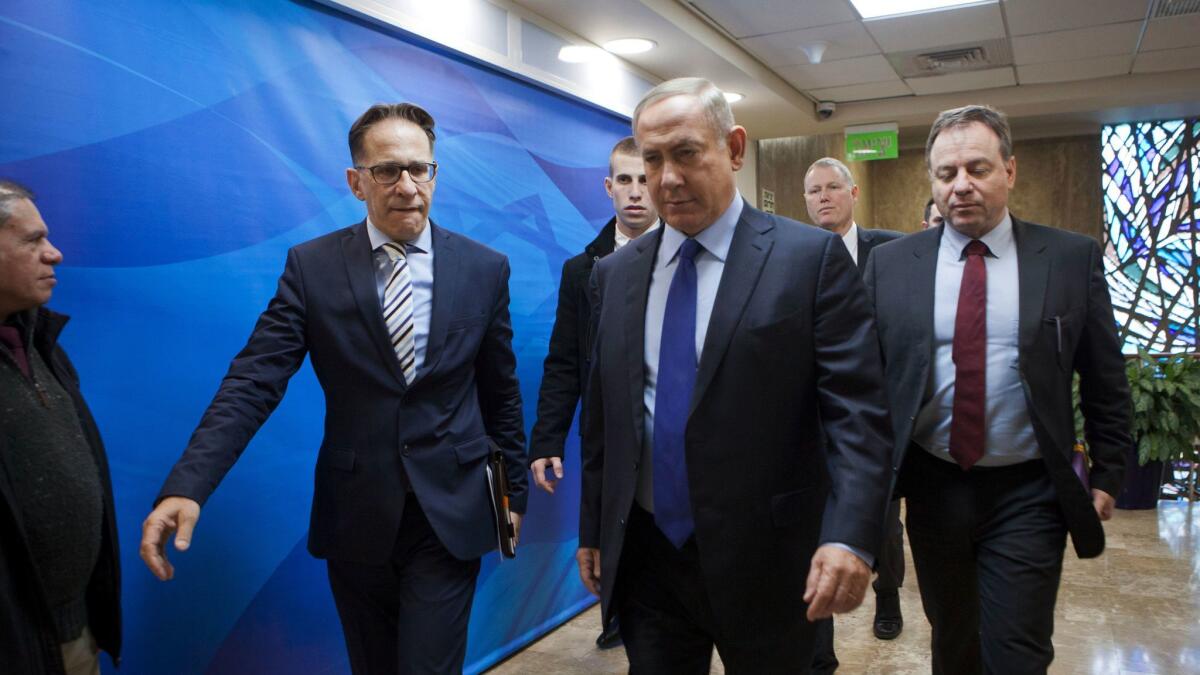Netanyahu, furious over U.N. vote on Jewish settlements, summons U.S. ambassador

Israeli Prime Minister Benjamin Netanyahu, second right, arrives for a weekly Cabinet meeting in Jerusalem on Dec. 25, 2016.
- Share via
Reporting from Tel Aviv — Still fuming over a United Nations Security Council resolution passed Friday that deems Jewish settlements in the West Bank and east Jerusalem illegal, Israeli Prime Minister Benjamin Netanyahu took the rare step of summoning the U.S. ambassador to express his displeasure with the Obama administration for allowing the measure to pass.
The U.S. had abstained from voting on Security Council Resolution 2334, which passed 14 to 0. The decision not to exercise the U.S.’ veto power as one of the five permanent members of the Security Council was criticized in Israel as a break with American policy to shield Israel at the U.N.
The decision recognizes all of the West Bank and Jerusalem captured by Israel and the 1967 Arab-Israeli war as “occupied Palestinian territory” and calls for an immediate and complete halt of Israeli building there. Though the Security Council decision is expected to have little immediate effect, analysts say it could give added legal momentum to a possible effort to sue Israel in the International Criminal Court or impose sanctions on Israel.
Speaking at the weekly meeting of his Cabinet on Sunday morning, Netanyahu said he was angry over the U.N. vote, and accused the outgoing Obama administration of acting as the hidden hand behind passage of the resolution.
“There is no doubt that the Obama administration initiated it, stood behind it, coordinated the drafts and demanded that it pass,’’ he said.
Netanyahu requested a meeting with U.S. Ambassador Dan Shapiro to discuss the decision.
An official at the U.S. Embassy confirmed the meeting request by the prime minister. The official declined to respond to Israeli criticism of U.S. handling of the resolution.
Other Israeli politicians were more forceful in their criticism of the U.S. administration. Regional Cooperation Minister Tzachi Hanegbi told reporters that the Obama administration had stabbed Israel in the back. Michael Oren, a deputy minister and former ambassador to the U.S., told Israel Television that the goal of the resolution is to “destroy” Israel economically by exposing it to sanctions and lawsuits.
The meeting with Shapiro was the latest in a series of diplomatic moves Israel has made in recent days to push back on the resolution. Ambassadors of all 14 countries that supported the resolution in the Security Council were also called into the Foreign Ministry on Sunday in protest. Meanwhile, Defense Minister Avigdor Lieberman ordered the suspension of civilian and political meetings with the Palestinian Authority.
The international community considers the Jewish settlements in the West Bank a violation of international law and an obstacle to efforts to create a continuous Palestinian state in the territory. Israel says that resolutions at the U.N. on the peace process are unilateral moves that will make it more difficult to restart negotiations, which have been mothballed for two years.
Palestinian officials, who have criticized settlement expansion for years, hailed the resolution as a victory. Speaking to Israel Army Radio on Sunday, chief negotiator Saeb Erekat said the resolution supports a two-state solution. “What is disgraceful is the continuation of the building of settlements on what is supposed to be Palestinian land,’’ he said.
The passage of the resolution put Netanyahu on the defensive at home. Newspaper commentators said the prime minister clashed too many times with President Obama and went too far to curry favor with pro-settlement politicians in his coalition, for example by supporting legislation to retroactively legalize settlement activity on Palestinian property.
Analysts say that pressure is fueling Netanyahu’s fiery response to the U.N. vote. “The overreaction is symptomatic of the fact that I think he knows that this is a mistake, that he messed up,” said Jonathan Rynhold, a political science professor at Bar-Ilan University and an expert on U.S.-Israeli relations.
“He understood that by placating the ideological right he created a position where it was easy for Obama to do what he did. He made a choice to consolidate and maintain his right-wing base, and there’s a price for that,” Rynhold said.
Mitnick is a special correspondent.
ALSO
Israel’s high court delays demolition of West Bank outpost
Palestinian Authority leader Mahmoud Abbas consolidates control over his party
Trump administration could upend decades of U.S. policy on Israel and Palestinians
More to Read
Sign up for Essential California
The most important California stories and recommendations in your inbox every morning.
You may occasionally receive promotional content from the Los Angeles Times.










